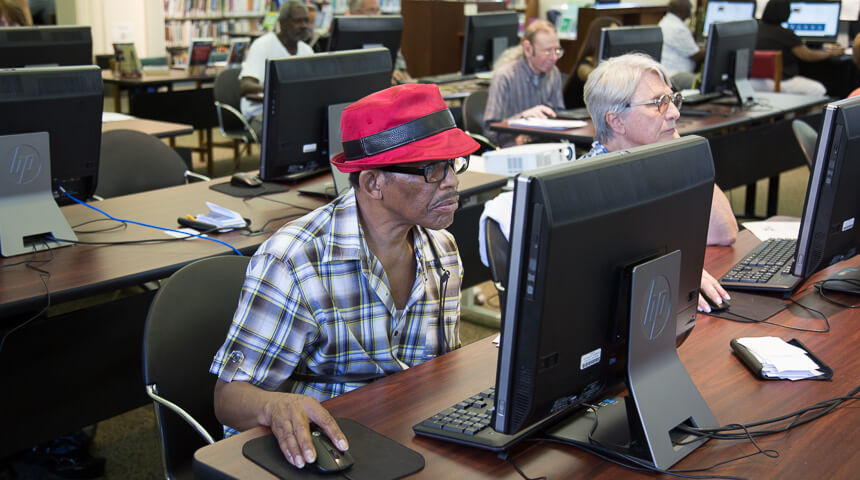Did you ever find yourself trying to apply for a job, yet all you had was a paper resume from 10 years ago and no way to get it online to complete the application process?
Or, maybe you look at the computer screen and don’t know what to click — or even how to click — to find your next apartment.
In 2019, Carnegie Library of Pittsburgh wants to make sure that 100 percent of the city’s adults will be able to access the information and services they need on the Internet.
“We’re taking it as our mission, that it’s our responsibility to make sure that everybody in our community is able to do a basic set of functions, mostly on the internet, that are the things you need to be a day-to-day citizen,” says Dan Hensley, Adult Programming Coordinator.
The Library’s goal is to ensure that all Pittsburgh adults are digitally literate, meaning they know 10 basic skills that allow them to maneuver their way around the computer.
“Technology can seem really overwhelming if you don’t have any context for it,” Hensley says. “We’re just saying, ‘It’s just these ten things, and we’re going to break it up into little bits and bring everybody along.’”
The Library aims to help every Pittsburgh adult:
- Learn the important parts of a computer.
- Be able to get to important places and organize their work on a computer.
- Use Library computers to log-in, print, and look up a book, movie, or CD.
- Safely and securely access the Internet.
- Use job search portals.
- Know how to sign-up for email and Facebook.
- Send and receive messages on email.
- Write a letter on Word.
- Create a simple budget with Excel.
- Save important documents online.
“They’re some very basic practices of just good digital hygiene,” Hensley says.
The library has lots of ways it plans to help all Pittsburgh adults gain these skills.
In 2019, it will expand class offerings that are now focused at CLP – Main to be held throughout the library system, so that people won’t need to travel as far to learn. And, there will be a standardized way for people to make one-on-one appointments to get help.
The Library also will bolster its efforts so that outreach programs to community groups and area centers will include digital literacy training.
The Library also has created Pathfinders, or how-to sheets, that will serve as a resource for people. The Pathfinders will be available for people to pick-up on their own if they need help, used during appointments and classes, and even given to patrons to take home to help their families improve their digital literacy.
For those hesitant about asking for help, Digital Learn videos can be watched on your own to learn your way around the computer. The goal also is for patrons to share the videos with people in their lives who might need help with computers, Hensley says.
In doing all of this, the library hopes to bridge the digital divide in Pittsburgh — the idea that there are haves and have nots in terms of technology.
“People who do not have access to technology are at a disadvantage in a lot of ways,” Hensley says.
Julia McMahon, Librarian Assistant at CLP – Downtown & Business, sees this first hand.
Patrons often visit the Library asking for help operating a computer.
Many are applying for jobs, yet they lack the skills to maneuver their way around the Internet, she says.
“If you’ve never seen a Drop Box before, that’s a crazy concept to take in,” McMahon says.
She often helps patrons print a resume or apply for a job — always letting them take the driver’s seat, while offering assistance. And they often let her know the outcome of her efforts.
“Patrons come back and say, ‘Hey, I got that job,’” she says. “Or, they stop coming in and you’re like ‘You know what, I’ll bet they got that job!”
The approach with the digital learning initiative is realizing that everyone benefits from a lifelong learning mentality.
Everyone has their own reason why they need or want to learn these skills.
“Whether that’s so they can do their taxes, so they can connect with their family on Facebook, so they can open an email attachment that has a menu that they want to see for an event that they’re having,” Hensley says, “we kind of see very specific, personal-oriented goals.”
While they’re learning new skills — and maybe finding a new way to stay in touch with family or finding an apartment online — people also are gaining confidence as they improve their digital literacy, Hensley says.
“They’re also more likely to continue engaging in learning,” he says.
Interested in learning more about Digital Literacy at CLP?
Check out these upcoming programsBy Stephanie Hacke

